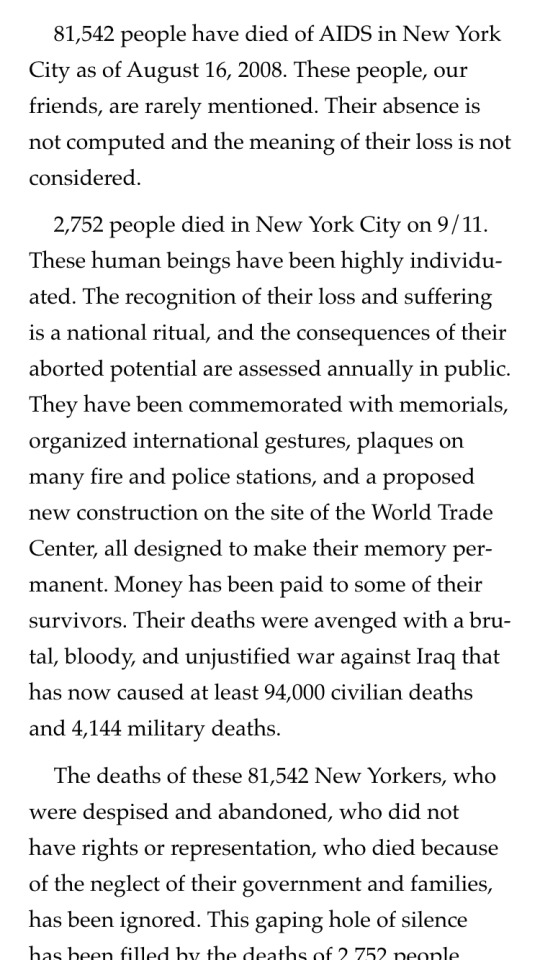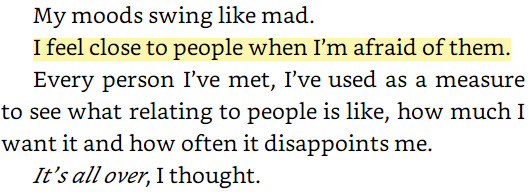#sarah schulman
Text

#hamas#israel palestine war#israel palestine conflict#terror#sarah schulman#conflict is not abuse#quote#usa#democrats
4K notes
·
View notes
Text
"I visited Vito Russo at New York University Medical Center, he lay in bed with a Silence = Death button on his striped pajamas. He wanted to know everything that was happening out there in his beloved world. Others couldn't bear to think about what they were missing. When he died, the message on his answering machine said, 'This is Vito. I'm sorry I'm not here.'"
-Sarah Schulman, Gentrification of the Mind, 2012
96 notes
·
View notes
Text

Sarah Schulman, Gentrification of the Mind
61 notes
·
View notes
Text
Sarah Schulman's "If a person cannot solve a conflict with a friend, how can they possibly contribute to larger efforts for peace?" 🤝 Chris Fleming's "You call yourself a community organizer, even though you're not on speaking terms with your roommates"
#been thinking some thoughts#shitpost o'clock#sarah schulman#conflict is not abuse#chris fleming#the grad student shuffle
89 notes
·
View notes
Text

Sarah Schulman / After Delores
#sarah schulman#after delores#book quotes#literature#quotes#booklr#litblr#book recommendations#queer lit#feminist literature#iceblinkluck.txt
109 notes
·
View notes
Text
She was an articulator of the post-sixties bohemian bad girl. Not a hippie but a kind of art thug. Kathy [Acker] was the girl who knew she had something to say that mattered, who loved sex and music and refused to be obedient. Later cultural movements like punk girls, riot grrrls, rockers, goths, and even, weirdly, the deadly chick lit, can trace their origins to the territory she pioneered and the devoted followings she inspired in her day.
The Gentrification of the Mind: Witness to a Lost Imagination, by Sarah Schulman
47 notes
·
View notes
Text
https://theanarchistlibrary.org/library/william-gillis-one-giant-red-flag-folded-into-a-book
So much abuse is about trapping and monopolizing the target’s attention, feeling entitled to claim a chunk of their brain. The experience of being abused is often one of being forced into thinking about the abuser constantly, from trying to predict their acts to trying to follow the latest tangle in their proclamations. Abuse strips away agency by stripping away the capacity for the abused to think for yourself, to think about anything else or think at all. If the abuser controls critical needs then everything is devoted to trying to turn yourself into a complex key that can unlock those needs. If the abuser besieges and terrorizes you randomly, you form your brain into a vast prediction net, trying to preempt as best you can every single avenue by which they might strike. Or you huddle up and turn yourself off, turn your brain off, to try and weather through things like an inert object. All of these are about losing your capacity for agency in a way that extends beyond any physical constraints directly imposed upon you. Abuse takes over your brain.
Sometimes the abuser acts so as to not have to think about you, to terrorize you into smallness and confined predictability, but sometimes the abuser is themselves driven by their own ravenous attention on you and the need to make you dedicate that same level of attention to them. This sort of abuser is never more happy than when their provocations force you into direct immediate raw unthought emotional tangles with them. They yell and yell until you finally yell back, and then they grin in glee because they have you. Neither abuser can stand your escape to any degree, which they read as a direct assault on them.
There are many aspects of abuse, but abusers feel entitled to your attention.
I can’t emphasize this enough. Demanding that an ex listen to you, mobilizing The Community to force that ex to give you a monopoly over their brain is an abuser’s wet dream. It’s how thousands of accountability processes have derailed into an abuser continuously retraumatizing their survivor.
Schulman, it must be emphasized, has no argument for why we should be obligated to give away our attention to anyone who wants it. What she has instead is 1) a fixation on pain and suffering of those denied control over the attention of their targets, and 2) the repeated assertion that having no boundaries is “adult” whereas saying no is “childish.” Mature adults talk things out in person, only immature children—or those so traumatized and broken as to be infantile children—would draw a line around their attention and enforce it.
“In another example from other people’s lives, sometimes angry, supremacist, or traumatized people send emails commanding, ‘Do not contact me.’ I want to state here, for the record, that no one is obligated to obey a unidirectional order that has not been discussed. Negotiation is a human responsibility. Little children order their parents around: ‘Mommy, sit there!’ When adults give orders while hiding behind technology, they are behaving illegitimately. These unilateral orders do not have to be obeyed. They need to be discussed.”
It would be trivial to compose a little passage reversing the associations, casting knowing how to draw boundaries and assert one’s independence and agency as the “mature adult” position whereas being caught under the boot of others’ demands to the point where you can’t own your own associations or attention as the “child” experience. But I want to reject the entire adult supremacist frame she’s appealing to.
If the child often stomps their feet and declares “no”—no, I refuse to give uncle a kiss, no, I refuse to get dressed to be your marionette at an event, no, I refuse to listen to your lecturing—perhaps we should see that as an inspiring site of resistance by those most oppressed before they are ground down. Perhaps we should endeavor to be more like children desperately trying to assert their autonomy and consent as agents who get to choose. Certainly the world “adults” have built and perpetuated by beating each new generation into surrender is a clearly sickening and grotesque one.
Even though I personally have made choices to maintain some level of contact, I vehemently support every abused child who walked away from their parents and never answered their calls ever again. Hell, I support children who killed their abusers. You do not owe everyone a path for reconciliation and negotiation. From abusers to even just wingnuts and inane time burglars, the best option is sometimes to just walk away forever. We have limited time on this planet, why spend it trying to repair every single relationship you have so far happened into?
Schulman somehow cannot even fathom goals other than the maintenance of existing relationships.
“Refusing to speak to someone without terms for repair is a strange, childish act of destruction in which nothing can be won.”
Liberation can be won. There’s a world of possibility beyond the confines of one given relationship. Opportunity cost is a real thing that is worth considering. That nothing is gained in one specific relationship by walking away doesn’t mean that a world of possibilities can’t be gained through the absence and negation of that relationship.
#repost of someone else’s content#C4SS#gillis#sarah schulman#CINA#Conflict Is Not Abuse#abuse culture#abuse apologia#intimate partner abuse#child abuse#parental abuse#ageism#adultism#childism#freedom of association#autonomy#bodily autonomy#youth rights#youthlib#youth liberation#kyla#anarchism#anti nuclear family#nuclear family abolition
78 notes
·
View notes
Text
Are homophobic family members evil? Well, not if you believe that evil does not have a human face. Yes, the people who won’t take responsibility for their dying gay son, won’t invite their lesbian sister to their wedding, won’t allow their gay cousin to hold their child, won’t praise their gay co-worker, won’t send their gay son a birthday card, vote for anti-gay politicians, give money to a homophobic church, love films that diminish gay people—those people may have all kinds of great attributes. You may love them. They may have taken you fishing when you were six or made you a quilt for Christmas or had a great sense of humor or looked just like you. That is what evil looks like. Evil knows great old songs, can be weak and vulnerable, can love you, can feed the hungry, can pick out a book because they were thinking of you. Evil can have Alzheimer’s. Familial homophobia is deeply human, as all evil is the product of human imagination.
- from Ties that Bind: Familial Homophobia and Its Consequences by Sarah Schulman
#ngl#i think about this quote a lot#and i am thinking about it a lot right now#because i have family who votes for anti-queer politicians and supports anti-queer politicians#and i wonder how they can say they love me when they support people who basically want to see me dead#sarah schulman#queerphobia#homophobia
125 notes
·
View notes
Text
[“The announcer is discussing events that I know intimately, organically, that have seared the emotional foundation of my adult life. And yet there is a strangely mellow tone to the story. It's been slightly banalized, homogenized. This is the first time I've heard AIDS being historicized, and there is something clean-cut about this telling, something wrong. Something…gentrified.
“At first America had trouble with People with AIDS,” the announcer says in that falsely conversational tone, intended to be reassuring about apocalyptic things. “But then, they came around.”
I almost crash the car. Oh no, I think. Now this. Now after all this death and all this pain and all this unbearable truth about persecution, suffering, and the indifference of the protected, Now, they're going to pretend that naturally, normally things just happened to get better. That's the way we nice Americans naturally are. We come around when it's the right thing to do. We're so nice. Everything just happens the way it should.
This? I realize the way one realizes that the oncoming train is unavoidable and I'm stuck on the track. This is going to be the official history of AIDS?”]
sarah schulman, from gentrification of the mind: witness to a lost imagination
311 notes
·
View notes
Text
“I think there’s a fake fantasy of solidarity that is like the rainbow: one of you, and one of you, and we’re all happy and we all look alike and we’re all together, and that’s really not what it is. It’s a fraught and constantly shifting series of relationships. And as much as it is a fantasy, it is also an absolute necessity because at least in the United States, change only comes from coalition, and if you’re out there on your own, you cannot transform the society.”
- Sarah Schulman
6 notes
·
View notes
Text

Sarah Schulman, Conflict Is Not Abuse: Overstating Harm, Community Responsibility, and the Duty of Repair (2016)
#sarah schulman#conflict is not abuse#israel#palestine#i've been thinking a lot about this section of her book recently and the way this pattern repeats#i admire her emphasis on the chronology of events and the way she keeps perspective on the material violence happening#a book that has a lot to offer people everywhere i think#my posts
2 notes
·
View notes
Text

This really says it
6 notes
·
View notes
Text

Sarah Schulman / After Delores
#sarah schulman#after delores#book quotes#quotes#literature#queer lit#booklr#litblr#web weaving#iceblinkluck.txt
9 notes
·
View notes
Text
[O]ne of the paradigms we've created about AIDS is that of the dead genius. Of course, most of the people who died were not geniuses or great. They were just people who did their best or didn't even try at all. Some of them were nasty and lousy, others mediocre. Some knew how to face and deal with problems, others ran away and blamed the people closest to them.
The Gentrification of the Mind: Witness to a Lost Imagination, by Sarah Schulman
#the gentrification of the mind#sarah schulman#they were just people#which hurts even more#AIDS#queer history
21 notes
·
View notes
Text
There is something inherently stupid about gentrified thinking. It's a dumbing down and smoothing over of what people are actually like. It's a social position rooted in received wisdom, with aesthetics blindly selected from the presorted offerings of marketing and without information or awareness about the structures that create its own delusional sense of infallibility. Gentrified thinking is like the bourgeois version of Christian fundamentalism, a huge, unconscious conspiracy of homogenous patterns with no awareness about its own freakishness. The gentrification mentality is rooted in the belief that obedience to consumer identity over recognition of lived experience is actually normal, neutral, and value free.
Sarah Schulman, Gentrification of the Mind: Witness to a Lost Generation
1 note
·
View note
Text
Milan Kundera's masterful novel The Book of Laughter and Forgetting engages the ways that pretending away the truth cripples the integrity of both individuals and nations. The very privilege of supremacy—the ability to deny that other people are real— becomes the fatal flaw keeping us from collective integrity as a society. Thus, pretending away the deaths of 540,436 adults and 5,369 children from AIDS in the United States of America (as of 2008) becomes a mammoth action of self-deception, with enormous consequences for our decency. Ignoring AIDS as it was happening, and then pretending that past AIDS has no impact on survivors or perpetrators, allows us to pretend that ongoing AIDS is inevitable, sad, and impossible to change.
There is something inherently stupid about gentrified thinking. It's a dumbing down and smoothing over of what people are actually like. It's a social position rooted in received wisdom, with aesthetics blindly selected from the presorted offerings of marketing and without information or awareness about the structures that create its own delusional sense of infallibility. Gentrified thinking is like the bourgeois version of Christian fundamentalism, a huge, unconscious conspiracy of homogenous patterns with no awareness about its own freakishness. The gentrification mentality is rooted in the belief that obedience to consumer identity over recognition of lived experience is actually normal, neutral, and value free.
Sarah Schulman. The Gentrification of the Mind: Witness to a Lost Imagination
3 notes
·
View notes